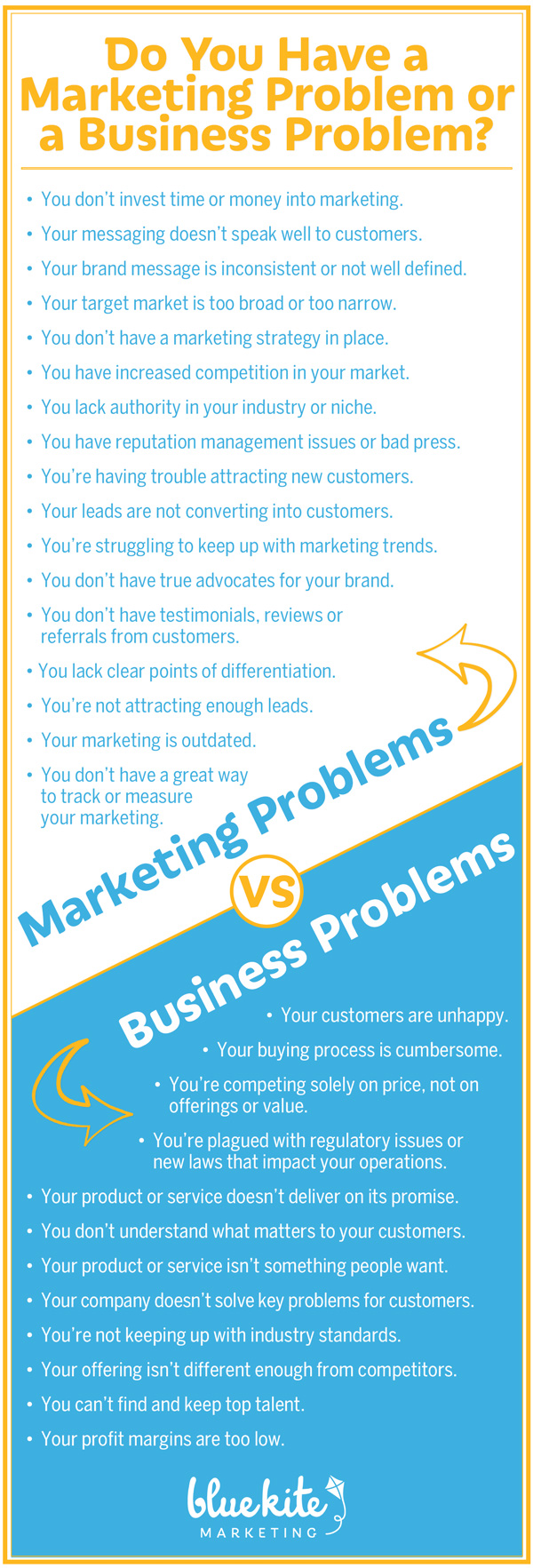When we begin working with a client, we always start with our in-depth marketing strategy process.
Through this process, we do a deep-dive into our client’s businesses to understand who they are, what they do and what problems they solve.
In addition to talking to our client, we also conduct research with their customer base to better understand their perspectives on how our client is delivering.
What we uncover through this process is always very enlightening.
Although our job is to solve marketing problems, we sometimes discover the real issue is a business problem.
After all, the best marketing in the world cannot save a terrible business.
If your product or service sucks, marketing is just like putting lipstick on a pig.
Sure, marketing might make your business look better for a while, but eventually, people will discover that your pretty marketing is covering up a lousy product.
That’s why it’s important to identify your problem first before you can enlist the proper help for your organization.
Marketing Problems vs. Business Problems
So, how do you know if you have marketing problem or a business problem?
This requires some research on your part. Talking to your customers and your team will help you pinpoint key issues.
Once you have some answers, you can determine where they fall. Although this isn’t a comprehensive list, here are some clues to which issues are marketing problems and which ones are business problems.

Marketing Problems:
- No one knows your company exists.
- You don’t invest time or money into marketing.
- Your messaging doesn’t speak well to customers.
- Your brand message is inconsistent or not well defined.
- Your target market is too broad or too narrow.
- You lack clear points of differentiation.
- You don’t have a marketing strategy in place.
- Your marketing is outdated.
- You have increased competition in your market.
- You lack authority in your industry or niche.
- You have reputation management issues or bad press.
- You’re having trouble attracting new customers.
- You’re having trouble retaining customers.
- You’re not attracting enough website traffic.
- You’re not attracting enough leads.
- Your leads are not converting into customers.
- You don’t have a great way to track and measure your marketing.
- You don’t have testimonials, reviews or referrals from customers.
- You don’t have true advocates for your brand.
- You’re struggling to keep up with marketing trends.
Business Problems:
- Your customers are unhappy.
- Your buying process is cumbersome.
- Your product or service doesn’t deliver on its promise.
- You don’t understand your customers or what matters to them.
- Your product or service isn’t something people want.
- You can’t find and keep top talent.
- Your company doesn’t solve a key problem for customers.
- You’re not keeping up with industry standards.
- You’re plagued with regulatory issues or new laws that impact your operations.
- You’re competing solely on price, not on offerings or value.
- Your offering isn’t different enough from competitors.
- Your profit margins are too low.
Why You Must Identify Your Problem First
Before you can get the help you need for your business, you must take the time to understand the true problems you face as a company.
Otherwise, you’ll waste considerable time and resources implementing a solution that doesn’t get to the heart of the issue. Fixing your business problems first will ensure that your marketing efforts — whether you do it yourself or hire some help -will be far more effective.
What do you think? Do you know what problems you’re trying to solve at your company?



